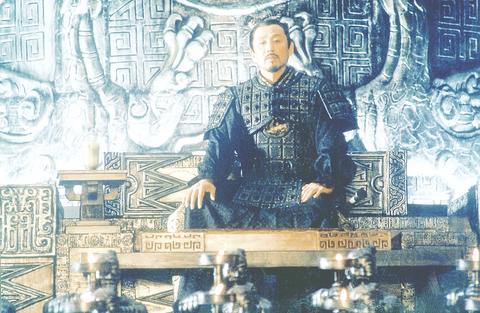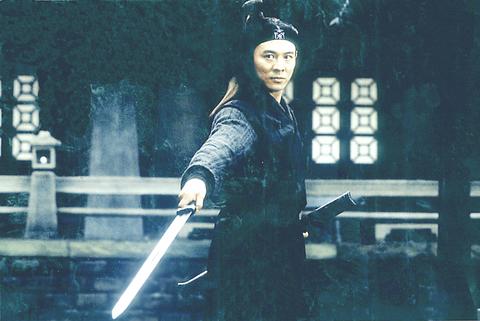The story of those who sought to stop the king of Chin from obliterating the diverse kingdoms that later became China has been told in countless books, plays, operas and films. The films on this subject have attracted China's greatest cinematic talent, but on the whole have failed to amount to much. Hero, which opens in Taiwan today, sees another of China's great directors bite the dust in dealing with this same subject.
Zhang Yimou's (

PHOTO: FOX
Hero is certainly something to look at, with two of Hong Kong's most charismatic stars, Maggie Cheung (

PHOTO: FOX
The story opens with Nameless (Jet Li), a sword fighter, entering the grand and forbidding palace of the king of Chin. The starkness of the hall represents the severity of Chin's law, and the symbolism sets the tone for the rest of the movie, which seems almost purposely to abjure any narrative warmth. Style, we are told in the opening scenes, is everything. The tricks that Zhang first used in Raise the Red Lantern (
And Zhang hasn't gone for anything as mundane as historical accuracy in his first costume epic. There is lots of floating gauze and creatively designed weapons, and the Chin soldiers are subjected to the indignity of shooting off their bows with their feet while sitting on the ground, which Zhang has confessed has absolutely no basis in history. But it may be thought exotic by Western audiences.

PHOTO: FOX
The film's structure follows Akira Kurosawa's classic Rashomon (1950) in that it goes over the same ground a number of times from different perspectives -- in this case, a battle of wits between Nameless and the king as to how Nameless managed to kill off Sky (
Unfortunately you never really care which of the versions presented is the true one because the director fails from the beginning to establish any empathy with the characters.
Which leads to the crucial issue of Zhang's resolution to his martial arts epic. Part of the uniqueness of his approach is that he violates many of the fundamental principles of the chivalric hero character -- apolitical, self-interested, care-free -- in order to achieve a grander vision, which unfortunately pulls the carpet out from under the feet of his "heroes," leaving them looking merely foolish. The end result is not an achievement of some higher state of heroism, but defeat at the hands of a tougher operator. For martial arts movie fans, it is all very unsatisfactory.
A long exposition about the character "sword," written by Broken Sword and presented to the king by Nameless, only goes further to underline the political and philosophical chaos that Zhang has become embroiled in, but he seems content to allow the Chinese "culture" of the whole thing to override any need for logical coherence.
Zhang's attempt to transform the selfish individualism of martial arts fighters into a superficial universal love kills all the glamor and fascination of the chivalric spirit. The freedom that characters like Nameless, Snow and Broken Sword are supposed to represent gets all twisted up into a tool of a political exposition.
But all this does not become clear until late in the film, which gets bogged down in its Rashomon structure, telling and retelling the story, leaving very little room for character development. This superficiality is embodied in the character of Moon, played by Zhang Ziyi, who is little more than a face and a clothes rack.
Unfortunately, this is almost the case with Tony Leung and Maggie Cheung as well. Fans of In the Mood for Love can only feel pity for the two great actors wasting their talent on such two-dimensional characters.
The most impressive acting is done by Chen Daoming (
The final scene, showing the king's greatest achievement, the building of the Great Wall -- and all it represents -- can only make one laugh at its total lack of subtlety.
Not only has Zhang compromised the spirit of the chivalric hero, he seems to have compromised his own integrity as well.
Hero
Directed by: Zhang Yimou
Starring: Maggie Cheung (Snow), Jet Li
(Nameless), Tony Leung Chiu Wai (Broken Sword), Zhang Ziyi (Moon), Donnie Yen (Sky)
and Chen Daoming (King of Chin)
Running time: 120 minutes
Taiwan Release: Today
Language: In Chinese with English subtitles

Towering high above Taiwan’s capital city at 508 meters, Taipei 101 dominates the skyline. The earthquake-proof skyscraper of steel and glass has captured the imagination of professional rock climber Alex Honnold for more than a decade. Tomorrow morning, he will climb it in his signature free solo style — without ropes or protective equipment. And Netflix will broadcast it — live. The event’s announcement has drawn both excitement and trepidation, as well as some concerns over the ethical implications of attempting such a high-risk endeavor on live broadcast. Many have questioned Honnold’s desire to continues his free-solo climbs now that he’s a

Francis William White, an Englishman who late in the 1860s served as Commissioner of the Imperial Customs Service in Tainan, published the tale of a jaunt he took one winter in 1868: A visit to the interior of south Formosa (1870). White’s journey took him into the mountains, where he mused on the difficult terrain and the ease with which his little group could be ambushed in the crags and dense vegetation. At one point he stays at the house of a local near a stream on the border of indigenous territory: “Their matchlocks, which were kept in excellent order,

Jan. 19 to Jan. 25 In 1933, an all-star team of musicians and lyricists began shaping a new sound. The person who brought them together was Chen Chun-yu (陳君玉), head of Columbia Records’ arts department. Tasked with creating Taiwanese “pop music,” they released hit after hit that year, with Chen contributing lyrics to several of the songs himself. Many figures from that group, including composer Teng Yu-hsien (鄧雨賢), vocalist Chun-chun (純純, Sun-sun in Taiwanese) and lyricist Lee Lin-chiu (李臨秋) remain well-known today, particularly for the famous classic Longing for the Spring Breeze (望春風). Chen, however, is not a name

There is no question that Tyrannosaurus rex got big. In fact, this fearsome dinosaur may have been Earth’s most massive land predator of all time. But the question of how quickly T. rex achieved its maximum size has been a matter of debate. A new study examining bone tissue microstructure in the leg bones of 17 fossil specimens concludes that Tyrannosaurus took about 40 years to reach its maximum size of roughly 8 tons, some 15 years more than previously estimated. As part of the study, the researchers identified previously unknown growth marks in these bones that could be seen only